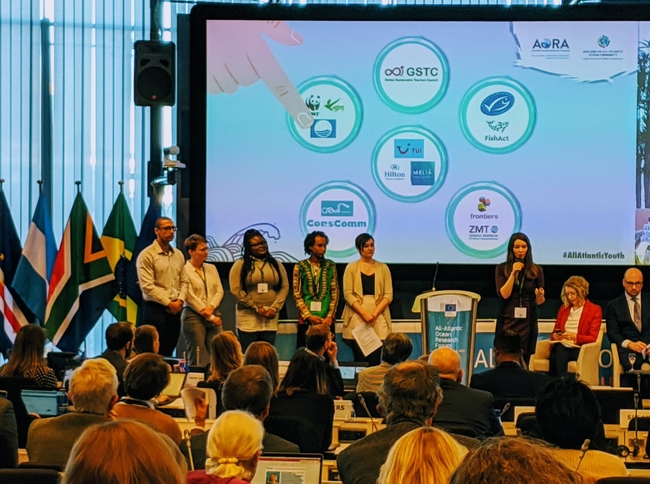11/02/2020 | ZMT colleagues working on the research project AANChOR (All AtlaNtic Cooperation for Ocean Research and Innovation) joined the recent All-Atlantic Ocean Research Forum in Brussels to discuss first results, create ideas for future activities and present their findings to the Forum, which saw political and community leaders, researchers and representatives from industry lively discussing the eminent issues related to the Atlantic Ocean.
AANChOR is a project financed by the European Commission to bundle initiatives in marine research in the Tropical and South Atlantic. Five work packages have been created to discuss the actual state in EU and National funded projects to enhance trans-Atlantic cooperation in capacity development, data exchange and infrastructure.
An important initiative has been launched in August 2019 by installing the group of the “All-Atlantic Youth Ambassadors”. Twenty three enthusiastic youngsters from countries all around the Atlantic Ocean are preparing campaigns to promote a better life with their Atlantic Ocean. The status of their projects was presented during the first session on Friday (February 7th) under the eyes of Mariya Gabriel, European Commissioner for Innovation, Research, Culture, Education and Youth, and various political representatives of the Atlantic Bordering Countries.
Natalie Prinz, a former master student from ZMT and one of the All-Atlantic Youth Ambassadors, co-presented the campaigns and gave a well-received talk detailing their project titled 'An Atlantic Ocean Connected to Our Citizens'. The All-Atlantic Youth Ambassadors envision the creation of a certification accrediting Atlantic-friendly tourism communities around the Atlantic Ocean to promote sustainable tourism. The talks were then followed by a panel discussion between Pascal Lamy (Chair of Horizon Europe Mission Healthy Oceans, Seas, Coastal and Inland Waters), James Honeyborne (Conceptor of Blue Planet II, BBC Documentary), Martin Visbeck (GEOMAR, Germany), and Abdoulaye Diagana (Abidjan Convention Secretariat, United Nations Environment Programme, Ivory Coast).
After her presentation Natalie Prinz said: “It was such an honour to speak in front of the European Commission and I very much hope that what we, the All-Atlantic Youth Ambassadors proposed, such as sharing scientific knowledge, (re)connecting people with the ocean and acting upon human impact on it, has left an impression. After all, we are the generation having to deal with increasing environmental problems affecting our oceans and things need to get moving now to find solutions to help with realising the words that have been said.”
During the All-Atlantic Ocean Research Forum participants developed plans to further implement the Galway and Belém Statements and defined a vision of how the Atlantic community could strengthen its international cooperation to seize the opportunities and address the common challenges facing the Atlantic Ocean and the communities that depend on it. One of the main foci was put on the projected changes the Atlantic Ocean and its ecosystems are predicted to undergo, as outlined in the IPCC Special Report on Oceans and Cryosphere and the IPBES Global Assessment Report on Biodiversity and Ecosystem Services, and to the solutions that research and innovation can provide to our societies.
Dr. Werner Ekau from ZMT, lead of the work package Capacity Development for AANChOR, added: “This forum, organised for the second time after Salvador, Brazil, in 2018, can become a major event for high level discussions and the interconnection between all the sectors having a stake in marine and maritime issues. A deep discussion between Science, Society and Industry is necessary to find sustainable solutions on the problems that the ocean is suffering: temperature increase and connected consequences such as hypoxia, fish migration and acidification, but also pollution, overexploitation of resources and destruction or conversion of habitats. Only concerted effort can bring positive results for the future. And the inclusion and engagement of young people in this discussion is trendsetting for coming years, especially when thinking of the UN Ocean Decade that starts in 2021 with a global conference in Berlin.”
“The two-day forum gave the different stakeholders from all across Europe and the Atlantic an opportunity to push the agenda forward, in order to tackle – among many other aspects – infrastructural challenges faced by the Atlantic ocean countries, let it be the availability of data on pollution, dwindling resources, declining biodiversity or the impact of global change. I was particularly impressed by the commitment of our major partners Brazil and South Africa and I very much hope that other nations join in,” said Dr. Nicolas Dittert, managing director of ZMT and lead of the work package “Common Standards for Information and Data Sharing” within AANChOR.





